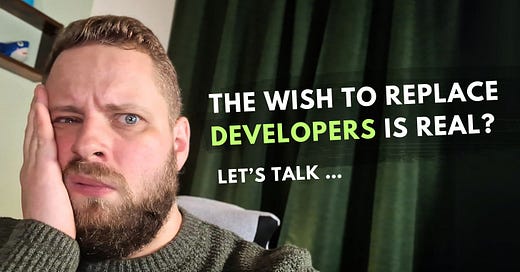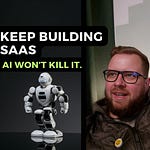The Future of Software Development: AI as Our Tool, Not Our Replacement
"The wish to replace software developers with AI is real. Leaders all over are talking about automating the simpler tasks in software development."
(from the podcast)
There is a real sense of unease growing within our industry. Many of us have heard whispers (or even loud proclamations) about some executives' dreams, a dream of replacing developers with AI. It sounds like a futuristic nightmare, right? And here we are, standing at the edge of that future, wondering: is AI our enemy or our ally?
Change Is Coming—But It's Not the End
Let's start with the facts. Yes, industry leaders and big corporations are heavily investing in ways to automate the more tedious aspects of programming. The goal is to use AI to do those parts of our job that feel repetitive: the code that follows well-worn patterns and the syntax that doesn't require much creativity. That's the reality. And while that may sound like a threat, it's crucial to understand what AI can and can't do.
Take a look at industries like automobile manufacturing. Back in 1960, about 7 million cars were produced by 1.6 million people. Fast forward to today, and we see 11 million vehicles made by just 900,000 people. Automation works in that industry because production is repetitive. The same happens with software, but here's the twist: software development is different.
In the software industry, the numbers tell a different story. In 2000, about 500,000 people were employed in the software industry in the US, and today, that number has tripled to 1.5 million. It's because demand is exploding, not shrinking. The IT powers almost every other industry—we're the backbone of innovation and efficiency. This growth means there is room for all of us as long as we adapt.
"If we leverage AI correctly, then developers will be more effective. The CEOs want us to focus on clients and business outcomes, not just coding." (from the podcast)
The Real Shift: More Than Just Coding
Let's be honest: many of us got into this field because we love coding. I'm one of them. I've been coding for over 30 years, starting on a Commodore and Amiga, writing things in BASIC. I loved every minute of it, and I still do. But now, things are changing, and I believe for the better if we let it.
AI, like GitHub Copilot, is not here to replace our jobs. It's a co-pilot, a calculator for complex coding tasks, allowing us to focus on the bigger picture, the architecture, the interaction design, and the real-world problems we're trying to solve. Imagine being able to offload that tedious boilerplate code or those repetitive tasks and instead spend more time understanding user needs, building the perfect feature, or even communicating effectively with stakeholders.
The key for us is to move away from seeing ourselves merely as coders. Instead, we should focus on the art and intuition behind good software design, on being the bridge between complex business needs and elegant technical solutions. AI is not here to replace the critical thinking, creativity, or empathy we bring to our work—it's here to enhance our efficiency.
Juniors and AI: An Opportunity, Not a Threat
"For experienced seniors, using AI as a tool is easy—but what about juniors? Should they dive in deep with AI? Not just yet." (from the podcast)
This brings up an important point, AI tools can challenge junior developers. When you're just starting, understanding the fundamentals of programming is crucial. AI can assist in completing code, but the knowledge behind why something works forms the core of a developer's growth.
For those of us mentoring juniors or hiring fresh talent, we need to be mindful of this. AI should be seen as a support tool that can help once the foundational skills are in place. It's a calculator, not a teacher. Our role as mentors and seniors is to ensure the juniors build a solid foundation first.
Key Takeaways
AI Is a Tool, Not a Threat:
AI handles repetitive tasks, allowing developers to focus on what matters—creativity, business needs, and architecture.Demand Is Growing, Not Shrinking:
The software industry continues to expand as more sectors become dependent on technology. There's room for us all if we adapt.Focus on What Matters:
CEOs want developers to focus on outcomes, not syntax. Use AI to help you become more efficient at what truly counts.Juniors Should Learn the Fundamentals First:
While AI can help with productivity, junior developers must understand the basics before diving into AI-assisted development.AI Won't Replace Human Intuition:
Understanding user needs, designing fluid experiences, and building quality solutions require human insight and empathy—something AI can't replicate.
What's Next for You?
So, here's the big question: will you let AI define your career, or will you use it to redefine what being a developer means to you? The demand for developers isn't going away. If anything, it will grow as technology becomes more embedded in every aspect of life. By learning to use AI to our advantage, we can focus on delivering value, solving real-world problems, and being the best version of ourselves as professionals.
Let me know your thoughts. Is AI a friend or foe? How are you adapting to these changes? I'd love to hear from you.
Have a great week, everyone.














Share this post